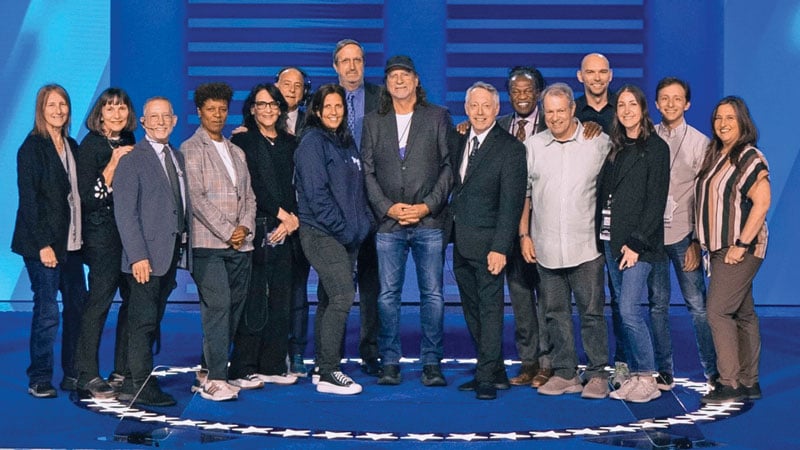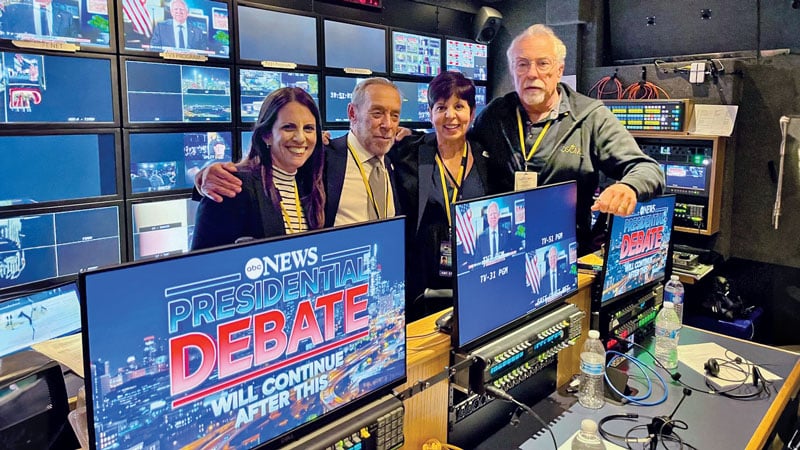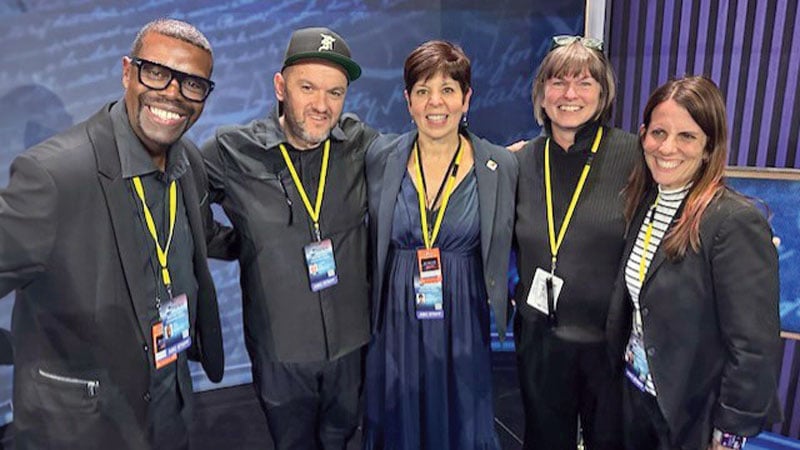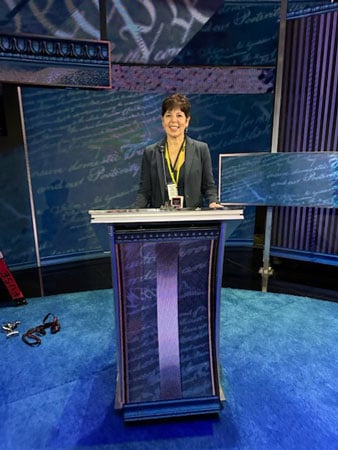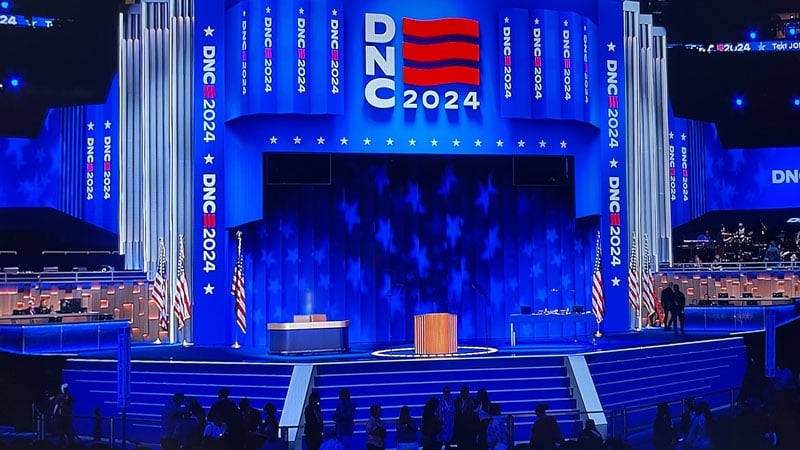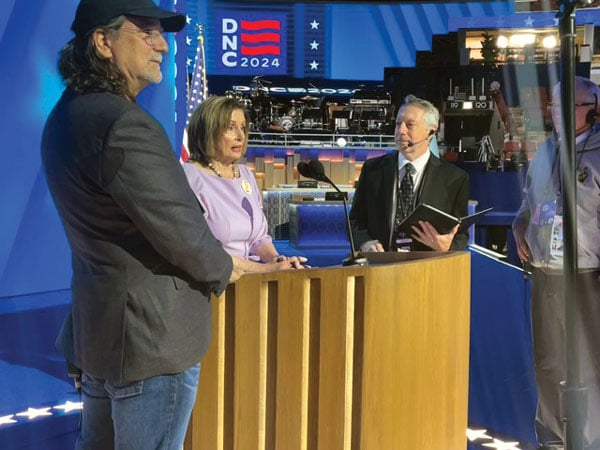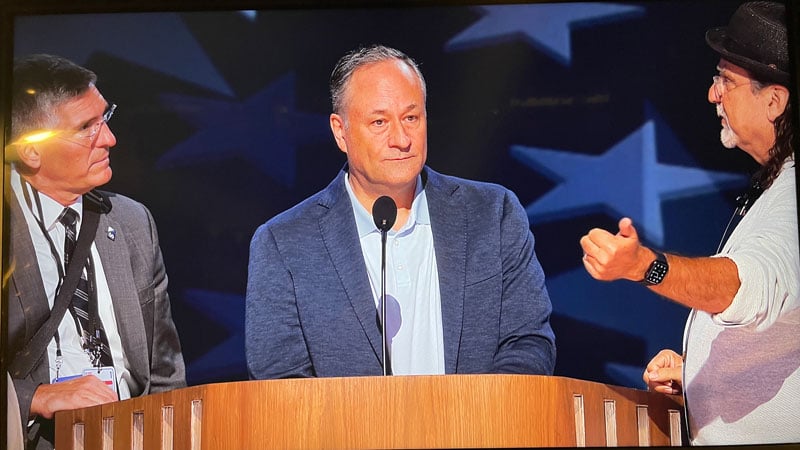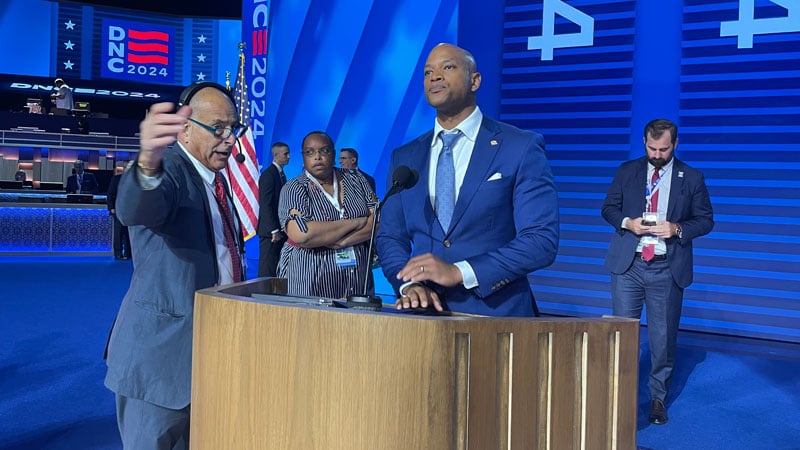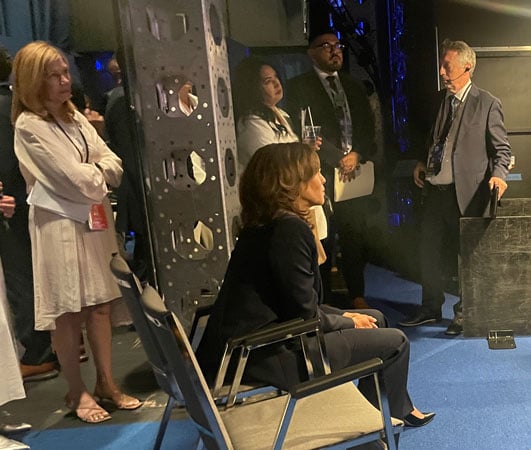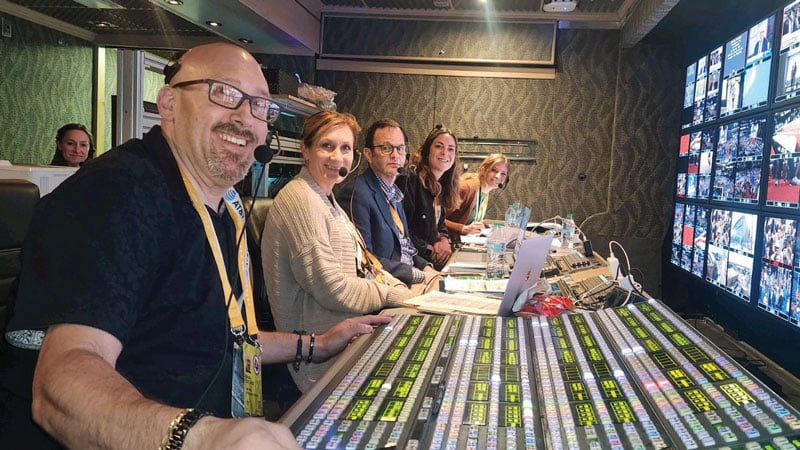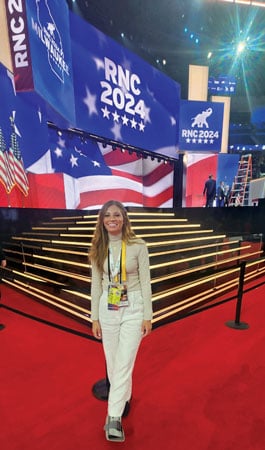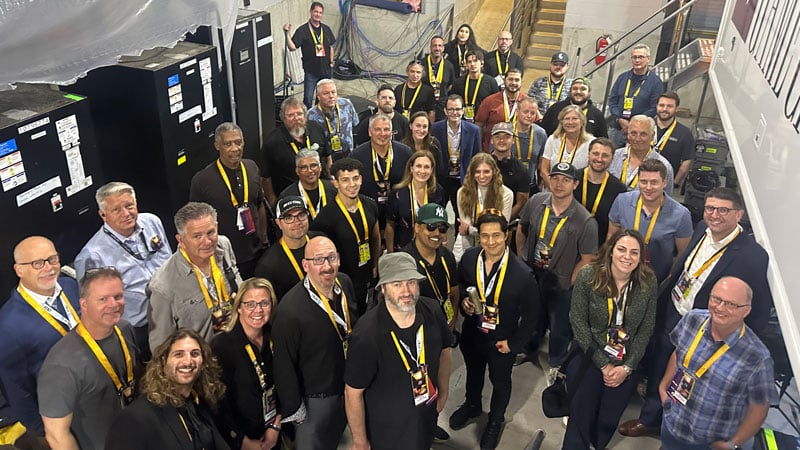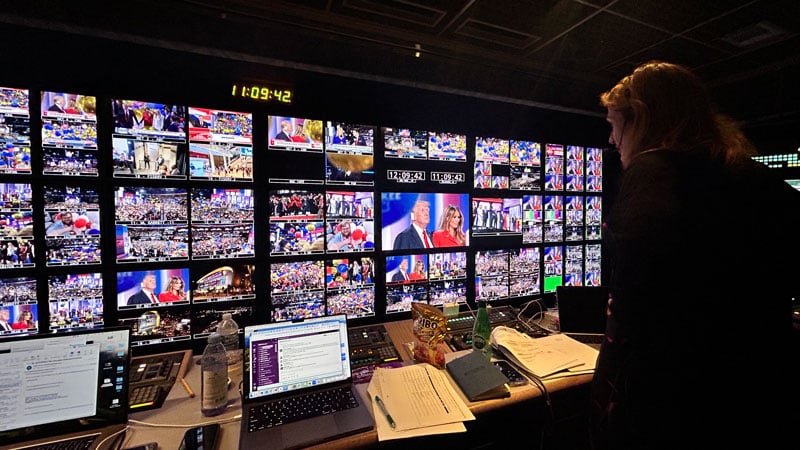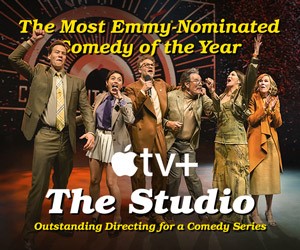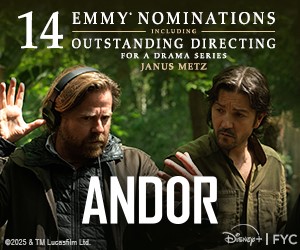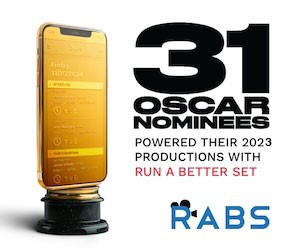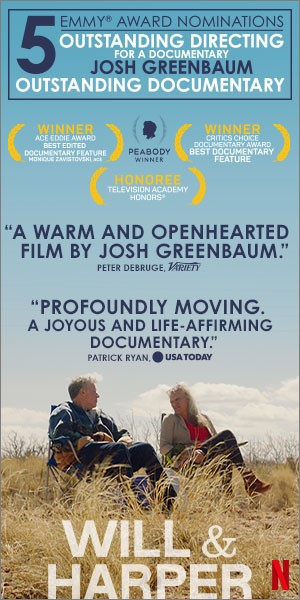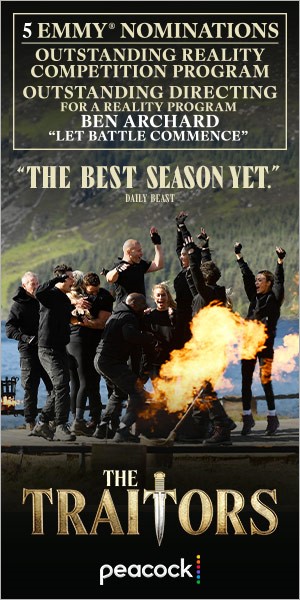In preparation for the upcoming 2024 Presidential Election, DGA members were active participants in critical events broadcast only once every four years to inform the electorate. Below is the inside point of view from members working on the multiple-day Republican and Democratic Conventions and the Presidential Candidate Debate.
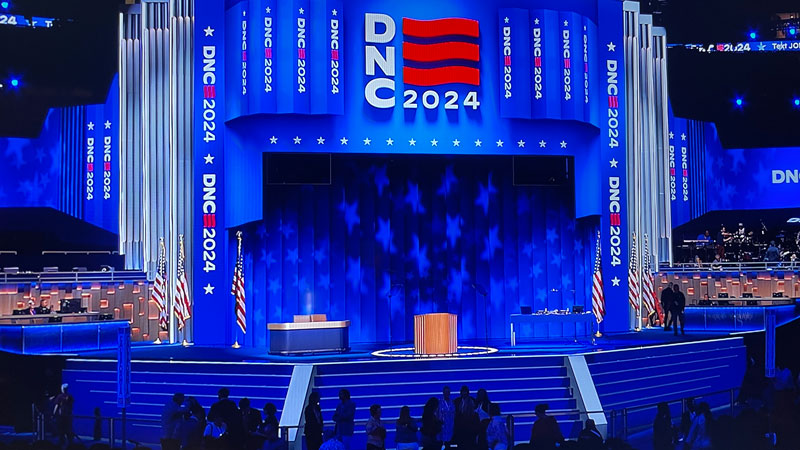 The Democratic National Convention
The Democratic National Convention
Director Glenn P. Weiss, a veteran of live events and variety shows who has helmed some of the biggest broadcasts including the Tonys, Oscars, Golden Globes, and Emmys, brought his expertise to the Democratic National Convention (DNC) in Chicago this past August.
With seven consecutive DNC conventions under his belt, Weiss oversaw the planning, design, staging, and execution of this year’s event — made even more challenging by the late shift of candidates from Biden to Harris — as well as directing the official DNC feed.
Weiss highlighted the unique challenges and triumphs of the 2024 convention, noting, “One of the biggest technical challenges was being able to create looks for a very ‘screen-based’ show and ‘rehearse’ everything from staging to roll call, to music acts to content displays while being in a room open to the press 24/7.”
Weiss also emphasized the crucial role of balancing speakers and audience reactions in live directing. “The balance of showing the speakers versus taking reaction shots is a very instinctual and important part of being a live Director,” he explained, noting that their use of IMAG screens to display reaction shots in real-time “helped create the energy in the room” and advanced the story beyond mere event coverage.
He particularly praised the innovative approach to the “Roll Call” on night two of the convention, describing it as his proudest moment.
“We decided to find a song for each state and have a DJ spin it while doing a complete screen takeover to match it, to make the Roll Call itself become an experience and performance.” Weiss’s creative direction, especially in moments like Lil Jon’s surprise appearance for Georgia, contributed to what he called “some of the biggest energy that I’ve ever felt from a show in my entire career.”
Associate Director Ken Diego, who also worked on the DNC’s broadcast/streamcast teams in 2008, 2016, 2020 and the RNC’s in 2012, agreed with Weiss’s assessment regarding the “roll call” sequence. “Glenn called a highly energetic sequence that turned a what would have been a fairly static and dry procedural process into a party atmosphere. Associate Director Susan Kopensky, me and the rest of the DGA AD/SM team worked closely with Glenn to provide him with the ingredients he needed at his fingertips to keep the energy going throughout the nearly 80-minute long sequence. Catch it on YouTube if you’ve missed it!”
“As the Associate Director on the event side, I can dig into the nuts and bolts of it all — coordinating with Producers, Stage Managers, the screens team, music department, which allows the Director to focus on the bigger picture and creative,” added Associate Director Susan Kopensky, who has worked on the DNC since 2008. “My brain is very linear — so I like to look at the rundown in order and just talk and plan through it. It helps if I know each item in detail so I can communicate what’s happening to everyone involved. Lots of information flows ahead of time but it really became about taking it day by day in the end.”
“The Director’s team is highly integrated in an event like this,” said Stage Manager Gary Natoli, who was handling his first national convention. “The rehearsals are much more challenging on most live variety programs than the show. In this instance, with the convention, the rehearsals were easier than the show. Things are constantly changing in real time, much like a news event. The run-of-show would be changed on the fly, with items added and deleted as the evening progressed. Because of this, communication was paramount between Glenn Weiss, Susan Kopensky and Ken Diego, myself and my Stage Managing team. As many program elements were crafted and adjusted on the day, we would have to be flexible and ready to pivot at any moment.”
“The challenges of executing a five-plus-hour show every night for four consecutive nights was reduced because we had a shorthand from working together in the past,” summed up Valdez Flagg, a Stage Manager with nearly 40 years experience on Guild productions. “We met at 6:30 each morning and discussed the event elements of the day and then each had our assignments. We rehearsed key speakers and performance elements during the morning and afternoon with Glenn Weiss, then set for the show.”
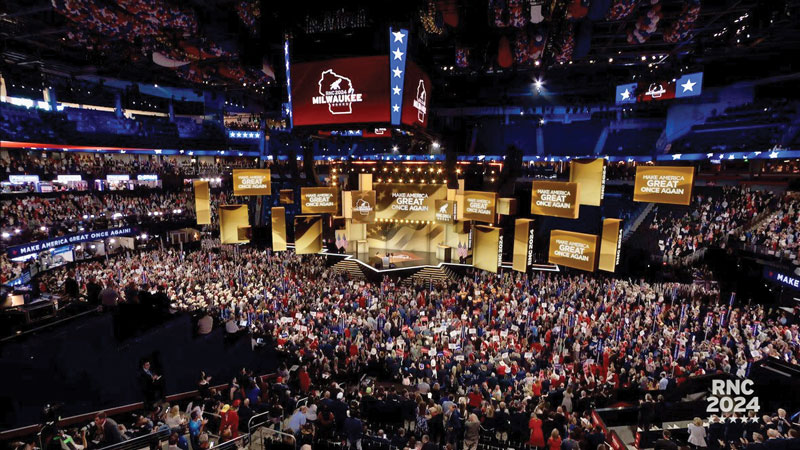 The Republican National Convention
The Republican National Convention
Director Ron de Moraes was tasked with heading up the coverage for the Republican National Convention (RNC). With over fifty years of experience as a multi-cam live and live-to-tape Director, de Moraes approached the 2024 event with a blend of seasoned expertise and innovative vision.
De Moraes drew on his experience as a private pilot to navigate inevitable hurdles. “When something goes wrong — and it will — you aviate, navigate, and communicate,” he explained. “Keep the show on the air, use what’s available to move forward, and allow the crew to work out solutions while you keep things running smoothly.”
His approach was simple yet effective: “I place myself virtually in the audience and ask, ‘What do I want to see at this moment that will tell the story of what’s happening and the reaction to it?’” This strategy allowed him to convey the atmosphere and energy of the convention to viewers at home, creating a dynamic visual narrative that captured the essence of the event.
The pool feed from the RNC was wrangled by a team headed by Director Sarah Carlson Brooke, who has helmed such notable events as Hillary Clinton’s 2016 election night gathering in New York and President Obama’s farewell speech in Chicago.
“As Director of the network pool, you are responsible for making sure all the networks get their technical needs met, said Brooke. “You go into production with a distribution plan and a back-up to that plan because anything can happen in a live environment. We consider if a fiber line gets cut how will the networks still receive the feed? To maximize our coverage without spending too much we agree to share resources and need to ensure that if a shared camera goes down, we can still do a show. From the pool perspective this is a news event; what if there is a moment on stage that is news making and the show production doesn’t want to cover it, do we have the resources to cover it? There are multiple back-ups to the plan.
“Technology has given me the ability to be more flexible both in pre-production and for the broadcast. I can plan for events efficiently from a distance, doing walkthroughs remotely and although not always ideal I can cut a show without being on location if we home-run the cameras. With consumer cameras being of higher quality we can add coverage without too much cost. All in all, more seems possible with the advance of technology.
“This year’s RNC was a massive event to cover. Months in the making, we were on the ground weeks in advance to cover a four-night event. My proudest accomplishment was putting together a team that not only were the best at their crafts but enjoyed working together as team.”
Associate Director Dawn DiCicco, who was working her first convention said of the event, “It’s been on my bucket list to be a Network Pool AD for a Convention after I listened to Katlyn McBrearty from CBS do the RNC in 2020. She and Clara Yang were so organized, efficient, and communicative that after the 2020 RNC was over, I said to myself, ‘If NBC ever draws the pool for Convention I want to do it!’ The Conventions are such a fun and interesting pool event to work on because the Network is essentially covering the production of another team’s show. For us, this meant having to coordinate every aspect of the broadcast with an outside team and finding ways to be flexible with changes we didn’t know were coming or didn’t have control of. It was a really challenging and rewarding experience to have your line cut be largely outside of your control, but it forced us to be extra nimble!”
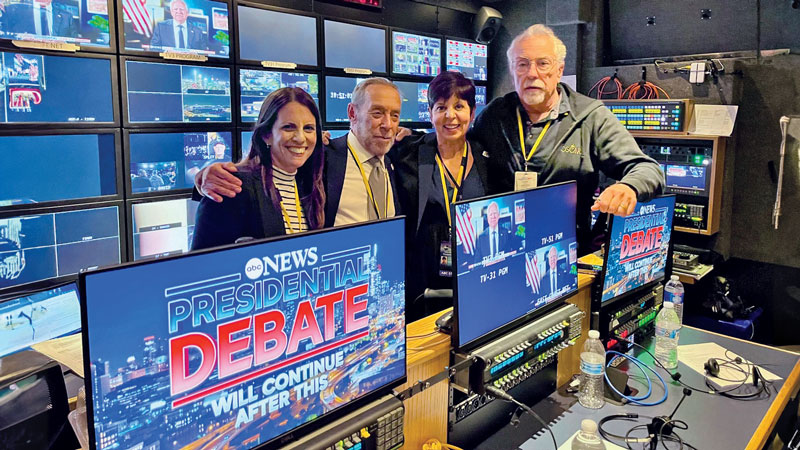 The Presidential Candidates Debate
The Presidential Candidates Debate
Democratic nominee, Vice President Kamala Harris and the Republican nominee, former President Donald Trump, engaged in their debate on September 10. DGA Sixth Vice President Lily Olszewski, a Director at ABC News, directing Good Morning America as well as special event news coverage, was the hand at the helm guiding the worldwide audiences to ABC’s coverage of the event.
“I have always wanted to direct a presidential debate,” said Olszewski, who is currently in preproduction to direct ABC News’ live election coverage on November 5. “Getting to do this debate in particular, with seemingly so much at stake, made it all the more fulfilling. My parents, immigrants to the United States, would have been so proud.”
“The biggest technical challenge is to make sure we get things right. An event like a debate becomes part of historical record and gets a great deal of scrutiny. In terms of production and transmission, we need to make sure we have backups and backups to backups for every technical system. We even had to get special clearance from Secret Service to allow a truck to come into a secure perimeter to gas up the generator day of air.”
“The small size of the stage, the closeness of the moderators relative to the two candidates, the absence of an audience and the dark blue tones in the set design created a very intimate setting, nodding to the high stakes of this event. I relied heavily on small, robotic cameras, primarily because of the space constraints — we were shooting in the round, on a small stage, in a venue with a steep audience grade. We were able to mount cameras around the room and tightly group the cameras shooting the moderators and the candidates to give us the coverage we needed.”
“Every Director is different and requires different things,’ said Associate Director Liz Sobel, who was part of Olszewski’s team. “This being Lily’s first debate, I wanted to take away as much from her as I could so she could concentrate on her cameras, lighting and audio. We have worked together before, and we have a great relationship. She’s so talented and great at communicating to the crew how best we can support her.
“This was obviously a very high-profile event. There’s a lot of tension, pressure, and nerves in the room. As the AD, I often try to lighten people up a bit before we go to air. Remind them how good they are, maybe crack a silly joke to make them laugh. All while, my nerves are kicking in and my heart starts racing, because my top priority is to get whatever production I’m working on, on and off the air cleanly.”
Stage Manager Anne Marie Kuehling, who also worked the RNC debate in December 2023 in addition to the September 10th Debate, recalled her role in making certain Olszewski had what she needed when she needed it.
“I feel it’s important for the Stage Manager to anticipate potential issues, knowing the Director counts on that level of detail,” said Kuehling. “My goal is to make her job go as smoothly as possible so she can do her best work. Until I get in the room I feel there’s nothing to prepare. The venue and Director will dictate how things move. I also like to be familiar with names and titles of those I’m dealing with, so I’ll do my homework I was very aware of the heightened security of the Presidential Debate so I familiarized myself with the space and was sure to discuss my plans on dealing with the candidate, with her team and the Secret Service. Otherwise, it was like any other live event.”
